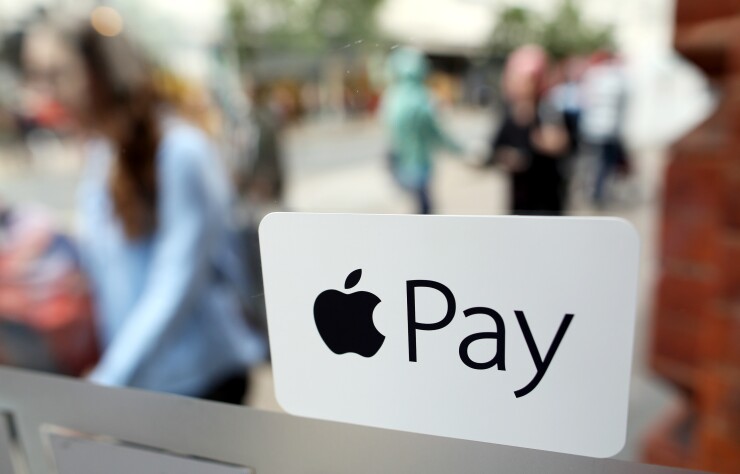
Apple's credit card portfolio has shaped up to be one of the most sought-after businesses in payments following the tech giant's split from Goldman Sachs in 2023. And while its popularity across the globe makes it an attractive acquisition to any major card issuer, Apple's wallet, Apple Pay, represents an even larger opportunity.
Visa and American Express are the latest companies to throw their hats in the ring, with the former offering $100 million to Apple to take over payment processing from Mastercard, according to a Wall Street Journal
"We don't comment on rumor or speculation," a Visa spokesperson told American Banker in an email. American Express and Mastercard declined to comment.
The move to secure processing rights comes about six months after
The suitors are key players that would be able to pull off a deal of this size and scope, according to a research note from Keefe, Bruyette & Woods.
"We are encouraged that [Synchrony] is still part of the process, but a successful outcome would have to be one where the financial incentives make sense," according to the note. "For [JPMorgan and [American Express], the financial synergies could be greater given the size and scope of their portfolio/network; and their ability to extract other advantages on lending and customer incentives."
On the surface, the network that wins the Apple Card stands to gain "a fair amount" of credit card transactions and "significant" network licensing and processing fees on all those transactions for both domestic and cross-border transactions, Eric Grover, principal at Intrepid Ventures, told American Banker.
"Co-brand credit card programs, if it's a reasonable co-brand partner, are very desirable, because in general the card holders spend more … the card holders perform better [and] the loyalty is greater," Grover said.
Visa has been struggling with growth in the U.S.'s mature market, Grover said. Taking away licensee programs from Mastercard would provide a "significant" source of growth for the network.
Visa has a track record of being aggressive in acquiring business it believes it wouldn't otherwise have reached. Nearly a decade ago, Visa secured the processing rights to
But the payment network that secures the Apple Card business stands to gain a lot more than incremental network assessment fees, Aaron McPherson, principal of AFM Consulting, told American Banker.
"They see it as a strategic move because Visa and MasterCard have been doing a lot lately with flexible credentials, which is basically walletlike software that enables [consumers] to change the source of funds in real time," McPherson said.
A payment processing deal with Apple Card would provide inroads to Apple's wallet, Apple Pay, allowing either party to integrate their flexible credential product – called Visa Flexible Credentials and Mastercard One – with the tech giant's popular digital wallet.
"It's a unique opportunity because of the integration between those three things to be able to experiment with some of these new payment modes," McPherson said. "Visa and MasterCard both are trying to reduce their dependence on credit card and debit card transactions and do other types of things like pay by bank or installment lending [such as buy now/pay later].
Access to Apple Pay would be the biggest gain for the winner of the deal, Richard Crone, CEO of Crone Consulting LLC, told American Banker. "Visa and Mastercard's credential strategies live or die by access," he said. "For Visa Flexible Credential and Mastercard One to succeed, they need access to a digital user interface and massive distribution. Apple Pay provides both."
Apple Pay would provide Visa with access to about 750 million global active users, according to independent estimates from Crone Consulting LLC. Each user has at least three payments registered in their Apple Pay digital wallet, totaling around 2.25 billion accounts, according to Crone Consulting.
By another measure, that represents about 53% of the 4.3 billion Visa cards issued globally.
"This would be the cheapest, most strategically significant deal in payments history if Visa wins it for just $100 million, just $0.13 per Apple Pay user, an extraordinarily low price for protected-from-competitors, front-door access to the fastest growing digital wallet platform on the planet," Crone said.
Accounting for three accounts per Apple Pay user puts the cost of acquisition at just over 4 cents per account, a fraction of the $471 to $706 per account
There's money to be made from tokenization revenue, too, that would help offset the cost of customer acquisition. Apple Pay and most other digital wallets tokenize every transaction.
Crone Consulting LLC estimates that the tokenization fees for Visa Flexible Credentials and Mastercard One Credentials are between $0.05 to $0.07 per transaction, meaning either network would need just one transaction per Apple Pay wallet to break even.
"This is a corner-lot deal in the credential business," Crone said. "Every Apple Pay transaction pings a token service provider — either Visa or Mastercard — and the network that wins becomes the default rails for all payment types: credit, debit, BNPL, pay-by-bank, prepaid, or crypto."






